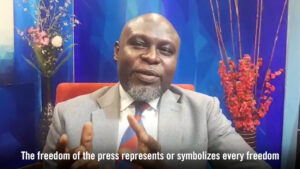For World Press Freedom Day we are excited to share a contribution from Mike Okwoche, a prominent TV news anchor for TVC News in Lagos, Nigeria, and an alum of the Broadcast Media International Visitor Leadership Program in 2017. Inspired by what he observed during his IVLP trip, Mike founded Rewired Africa Network to promote civic engagement through media and media literacy.
What does freedom of the press mean to you?

The freedom of the press represents or symbolizes every freedom that a country can get. So when we talk about freedom of the press or press freedom, that is the face of freedom in the country. Freedom of the press also means the freedom to dress, the freedom to associate, to move to eat and worship — the freedom to do anything. So, to me, the press is the arrowhead of freedom in a country. If the press is free to operate the way they’re supposed to, then all of us will be free to be anything that we want to be.
I remember traveling to the United States on my IVLP program, and my eyes were really opened to a lot of things. Visiting an institution like the Newseum in Washington, D.C. helped me to see what makes the press what it is. Journalism is the only thing that holds the government on one hand, and the people in the other, bringing them together to either understand or to become accountable to each other. [Journalism] goes a long way to defining who we are and who we are supposed to be. So press freedom is everything, and it is something we need to uphold by every means.
What is the role of journalists and journalism to enhance government and ensure transparency?
My trip to the United States changed my orientation when it comes to how best to hold government accountable, and how best to give voice to the people. Being a senior anchor and a newscaster and presenter on TVC, I’ve used my platform to give voices to people, and a lot of people have had their voices heard on my program. I’ve also conducted trainings as an associate lecturer at an institute of journalism, and I have mentored young people when it comes to what to expect in journalism and how best to approach it. Just this morning on my program we talked about the issue of transparency and the consequences of corruption; I brought guests on the program, people who have been in the fight against corruption for so many years. These are the things we do using my platform to ensure that I give voice to the people and hold government to account.
Do you have any inspirations or heroes in the journalism profession?
Growing up, we used to watch Cyril Stober, a journalist and newscaster in Nigeria. At that time, we used to have just one TV station in the whole country. He used to be the icon for Nigeria television, and he had a lot of influence and impact on all of us. I remember several times where I used to practice how to speak like him.
















